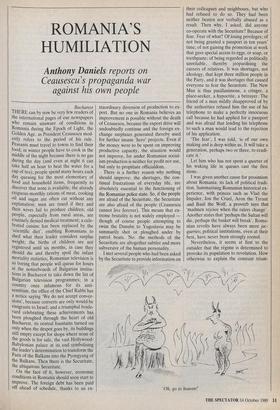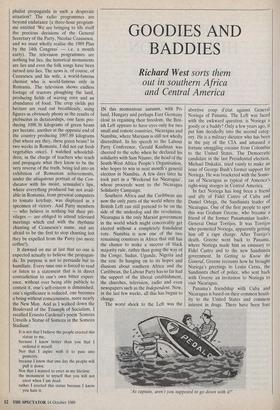ROMANIA'S HUMILIATION
Anthony Daniels reports on
Ceausescu's propaganda war against his own people
Bucharest THERE can by now be very few readers of the international pages of our newspapers who remain unaware of conditions in Romania during the Epoch of Light, the Golden Age, as President Ceausescu mod- estly refers to the period of his rule. Peasants must travel to towns to find their food; in winter people have to cook in the middle of the night because there is no gas during the day (and even at night it can take half an hour to heat the water for a cup of tea); people spend many hours each day queuing for the most elementary of food and household items, frequently to discover that none is available; the already exiguous monthly rations of meat, cooking oil and sugar are often cut without any explanation; men are taxed if they and their wives fail to produce children; old people, especially from rural areas, are routinely denied medical treatment; a cele- brated cuisine has been replaced by the 'scientific diet', enabling Romanians to shed what their leader considers surplus weight; the births of children are not registered until six months, in case they should die and thereby spoil the infant mortality statistics; Romanian television is so boring that people will queue for hours at the noticeboards of Bulgarian institu- tions in Bucharest to take down the list of Bulgarian television programmes; in a country once infamous for its anti- semitism, the office of the Chief Rabbi has a notice saying 'We do not accept conver- sions', because converts are only would-be emigrants to Israel; and a triumphal boule- vard celebrating these achievements has been ploughed through the heart of old Bucharest, its central fountains turned on only when the despot goes by, its buildings still empty except for shops where none of the goods is for sale, the vast Hollywood- Babylonian palace at its end symbolising the leader's determination to transform the Paris of the Balkans into the Pyongyang of the Balkans. Then there is the Securitate, the ubiquitous Securitate.
On the face of it, however, economic conditions in Romania should soon start to improve. The foreign debt has been paid off ahead of schedule, thanks to an ex-
traordinary diversion of production to ex- port. But no one in Romania believes an improvement is possible without the death of Ceausescu, because the export drive will undoubtedly continue and the foreign ex- change surpluses generated thereby used for further insane 'hero' projects. Even if the money were to be spent on improving productive capacity, the situation would not improve, for under Romanian social- ism production is neither for profit nor use, but only to propitiate officialdom.
There is a further reason why nothing should improve: the shortages, the con- tinual frustrations of everyday life, are absolutely essential to the functioning of the Romanian police state. So, if the people are afraid of the Securitate, the Securitate are also afraid of the people (Ceausescu cannot live forever). This means that ex- treme brutality is not widely employed though of course people attempting to swim the Danube to Yugoslavia may be summarily shot or ploughed under by patrol boats. No: the methods of the Securitate are altogether subtler and more subversive of the human personality.
I met several people who had been asked by the Securitate to provide information on their colleagues and neighbours, but who had refused to do so. They had been neither beaten nor verbally abused as a result. Then why, I asked, did anyone co-operate with the Securitate? Because of fear. Fear of what? Of losing privileges; of not being granted a passport in ten years' time; of not gaining the promotion at work that gave special access to eggs, or soap, or toothpaste; of being regarded as politically unreliable, thereby jeopardising the careers of relatives. It was shortages, not ideology, that kept three million people in the Party, and it was shortages that caused everyone to fear the Securitate. The New Man is thus pusillanimous, a cringer, a place-seeker, a hypocrite, a betrayer. The friend of a man mildly disapproved of by the authorities refused him the use of his telephone to make a perfectly innocuous call because he had applied for a passport and was afraid that lending his telephone to such a man would lead to the rejection of his application.
'The fear', I was told, 'is of our own making and is deep within us. It will take a generation, perhaps two or three, to eradi- cate it.'
Let him who has not spent a quarter of his waking life in queues cast the first stone.
I was given another cause for pessimism about Romania: its lack of political tradi- tion. Summarising Romanian historical ex- perience, with princes such as Vlad the Impaler, Ion the Cruel, Aron the Tyrant and Basil the Wolf, a proverb says that 'madmen rejoice when the rulers change'. Another states that 'perhaps the Sultan will die, perhaps the basket will break'. Roma- nian revolts have always been mere jac- queries; political institutions, even at their best, have never been strongly rooted.
Nevertheless, it seems at first to the outsider that the regime is determined to provoke its population to revolution. How otherwise to explain the constant trium- `Oh, go to heaven!'
phalist propaganda in such, a desperate situation? The radio programmes are beyond endurance (a three-hour program- me entitled 'We are bringing to life itself the precious decisions of the General Secretary of the Party, Nicolae Ceausescu, and we must wholly realise the 1989 Plan by the 14th Congress' — i.e. a month early). The television programmes are nothing but lies, the historical monuments are lies and even the folk songs have been turned into lies. The news is, of course, of Ceausescu and his wife, a world-famous chemist who is world-famous only in Romania. The television shows endless footage of tractors ploughing the land, producing fields of waving corn and an abundance of food. The crop yields per hectare are read out breathlessly, using figures as obviously phony as the results of plebiscites in dictatorships, one farm pro- ducing 1098.36 kilograms of green beans per hectare, another at the opposite end of the country producing 1097.89 kilograms (but where are they, these green beans? In two weeks in Romania, I did not eat fresh vegetables once). I watched schoolchil- dren, in the charge of teachers who teach and propagate what they know to be the very reverse of the truth, being led into.an exhibition of Romanian achievements, under the ubiquitous portrait of the Con- ducator with his moist, sensualist's lips, where everything produced but not avail- able in Romania, from personal computers to tomato ketchup, was displayed as a specimen of victory. And Party members — who believe in nothing but their pri- vileges -- are obliged to attend televised meetings which end with the rhythmic chanting of Ceausescu's name, and are afraid to be the first to stop chanting lest they be expelled from the Party (no more coffee!).
It dawned on me at last that no one is expected actually to believe the propagan- da. Its purpose is not to persuade but to humiliate. Every time one is forced to read or listen to a statement that is in direct contradiction to one's own bitter experi- ence, without ever being able publicly to contest it, one's self-esteem is diminished, one's significance is reduced, one becomes a being without consciousness, more nearly the New Man. And as I walked down the Boulevard of the Triumph of Socialism, I recalled Ernesto Cardenal's poem 'Somoza Unveils a Statue of Somoza in the Somoza Stadium':
It is not that I believe the people erected this statue to me,
because I know better than you that I ordered it myself.
Nor that I aspire with it to pass into posterity, because I know that one day the people will pull it down.
Nor that I wanted to erect in my lifetime the monument to myself that you will not erect when I am dead: rather I erected this statue because I know you hate it.



























































 Previous page
Previous page